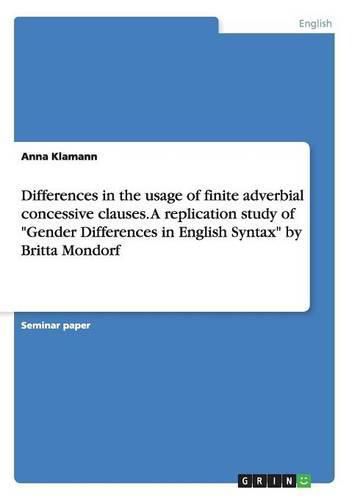Differences in the usage of finite adverbial concessive clauses. A replication study of Gender Differences in English Syntax by Britta Mondorf
Anna Klamann

Differences in the usage of finite adverbial concessive clauses. A replication study of Gender Differences in English Syntax by Britta Mondorf
Anna Klamann
Seminar paper from the year 2015 in the subject English Language and Literature Studies - Linguistics, grade: 1.0, Johannes Gutenberg University Mainz (Department of English & Linguistics), course: Syntax, language: English, abstract: This paper is a partial replication of Mondorf’s (2004) study on Gender Differences in English Syntax and combines quantitative corpus data and methodology with the framework of functional grammar to analyse gender-differences in finite adverbial concessive clauses headed by although and whereas. The internal factors of semantic-type and position were examined and the result suggests a strong influence of sex onto the usage of finite adverbial concessive clauses, with an overall result of concessive clauses being the marked domain of men. Correlations between sex and language are often taken for granted, but empirical studies on this topic, especially in the area of syntax, are surprisingly rare. One of the main studies of the past two decades, about the correlation between sex and language, which investigates sex-differences in specific syntactic constructions, is Britta Mondorf’s work Gender Differences in English Syntax. Using the London-Lund Corpus (LLC), Mondorf empirically explores two areas of marked gender difference in English syntax , namely tag questions and finite adverbial clauses. For the purpose of this replication study, only finite adverbial concessive clauses will be considered. Mondorf’s study demonstrates the existence of gender differentiated syntactic behaviour in the LLC of spoken British English and shows that women are prolific users of those syntactic constructions that signal a low degree of commitment towards the proposition expressed .
This item is not currently in-stock. It can be ordered online and is expected to ship in approx 2 weeks
Our stock data is updated periodically, and availability may change throughout the day for in-demand items. Please call the relevant shop for the most current stock information. Prices are subject to change without notice.
Sign in or become a Readings Member to add this title to a wishlist.


